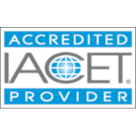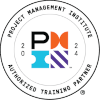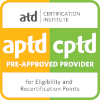Certificate Suite Details
Key Features
- Mobile-friendly
- Over 200 practice questions
- Audio-enabled
- Badge and credit-awarding
- Fully accessible
- Real-world case studies
- Expert-supported
- Games & Flashcards
- Video content
Certificate Preview
Certificate Description
Learner Feedback
Courses Included in this Certificate
Course Description
To efficiently lead projects, project managers need more than tools and techniques—they need skills that allow them to assess data and information and to make the most appropriate and effective decisions possible. They need to ask the right questions that will help them diagnose problems and make the right choices to propel teams to successful outcomes.
This self-paced, fully online course will guide learners through a systematic decision-making process for making carefully considered choices and reaching fully examined conclusions. It will help to refine and develop critical thinking and reasoning skills that will enable project leaders to assess options, generate plans of action, and put their teams in positions to succeed.
Course Credits
Course Description
Successful project leaders understand that, to help their teams meet their objectives, they'll need to employ solid leadership and interpersonal skills that aid and empower the team's members. They'll have to apply sound delegation and facilitation strategies that allow the project staff to stay focused and remain on task. They'll need to make use of strong conflict resolution and negotiations training to address any issues that could hinder team production. And they'll have to demonstrate ethical leadership and compliance qualities that project participants can look to to guide their decisions and actions.
This self-paced, fully online course will help learners explore the key leadership and interpersonal skill set project leaders use to oversee projects and organize teams successfully. They'll get an overview of the behaviors that support project management, which will allow them to productively address problems, keep teams on track, and build trust among their coworkers, colleagues, and stakeholders.
Course Credits
Course Description
Negotiation is a key element of any project management approach. Project leaders regularly negotiate with various stakeholders—clients, teams, management, and leaders of other organizational projects—to move their own project toward completion. In some cases, a project's success may depend on the project leader's ability to address competing interests through negotiation. Fortunately, anyone can develop strong negotiation skills through learning, practice, focus, and negotiations training.
This self-paced, fully online course will provide learners with the skills they'll need to successfully negotiate with internal and external project practitioners. It will help them establish their negotiation strategies and refine their techniques to successfully execute and complete projects.
Course Credits
Course Description
Communication is a critical aspect of any successful project. Effective project teams communicate continuously, to share knowledge, clarify project objectives, and address issues. Project practitioners spend a large amount of their time engaged in interpersonal communication activities, ensuring that information is widely distributed and participants are kept up to date on all project objectives. But some project participants may not have the required expertise or ability to communicate effectively.
This self-paced, fully online course will help project leaders understand and coordinate verbal and written forms of communication within and between project teams. It will help focus and clarify communication techniques and allow clear, concise, and direct interactions among all project practitioners and stakeholders.
Course Credits
Course Description
In recent years, views of leadership have changed. Today there is a greater understanding of the varieties of leadership in business, government, education, healthcare, and not-for-profit organizations, as well as in more personal areas like team leadership and family settings.
As a project leader, honing your leadership skills will allow you to successfully meet project objectives while motivating and engaging your team. Improving your leadership skills will enhance your standing as an asset to your organization while fostering team, project, and organizational evolution.
Course Credits
Course Description
Because projects bring so many people together to work collaboratively, it's inevitable—conflict will happen at some point. But a properly structured conflict resolution process will not only address problems in a timely manner, it may actually spark creativity and innovation as a team finds a new pathway to complete its work.
This self-paced, fully online course will help project leaders recognize potential workplace conflicts early and intervene at the appropriate point so they can minimize disruptions. It introduces a robust infrastructure that can prevent stalemates and resentment from interfering with the team's cohesion and solidarity. And it helps guide team members through forms of self-management so they can begin to correctly organize and settle disputes on their own.
Course Credits
Course Description
Effective project leaders rely on their project teams to complete work in a timely manner, but often, these teams need coaching and training that will encourage them to work together to achieve their objectives. The members of a project team could be talented individuals, but the team may need to be shaped into a unit that acts collaboratively to meet a project's goals.
This self-paced, fully online course will help learners enhance their team's ability to work cooperatively by clearly defining roles and responsibilities and inviting team members to play to each other's strengths. Learners will create, implement, and evaluate development programs that will help team members advance and improve and will learn to capitalize on team dynamic concepts to achieve success by better understanding team interactions.
Course Credits
Course Description
Very few projects—even the simplest and smallest—are completed without having someone request a change of some form. Changes will happen—they can't be avoided—so it's important to prepare your team for any disruptions that may occur to ensure the project is not delayed or derailed.
This self-paced, fully online course will help you address and manage the impact of any changes your team may encounter. You will explore the types, forces, and factors for change, and you'll learn how to use change management initiatives and models to overcome resistance and foster engagement. You'll discover how you can best communicate about change, and you'll learn how to sustain the gains you make as you incorporate changes into your projects.
Course Credits
Course Description
As a project leader, your project's stakeholders are some of your greatest assets. However, those assets are only valuable if you collaborate with and involve them on a regular basis. Customers, colleagues, team members, management, the community at large—they all have something to offer, but to capitalize on these resources, you'll need effective interaction and continuous stakeholder engagement to uncover their true worth.
This self-paced, fully online course will help you successfully collaborate with your stakeholders to improve your chances for project success. You'll learn to identify, analyze, manage, and encourage your stakeholder groups to be an integral part of your project's outcomes. And you'll see how meaningful interaction and engagement can strengthen cooperative efforts and enhance results to exceed expectations and requirements.
Course Credits
Course Description
At the beginning of a project, your responsibilities as a project leader will largely revolve around designing a plan that aligns with your organization's corporate strategy while providing fully functional deliverables that meet your stakeholders' needs. But project planning is not a one-time event: it occurs throughout a project's life cycle, so you need to remain prepared to make changes and have contingency plans in place to address unexpected situations.
This self-paced, fully online course will introduce you to the tools, techniques, and strategies you can use to develop successful projects and release plans. These tools and strategies can guide you in your efforts to create a just-in-time methodology that will complement your organization's strategic and tactical plans and enhance your product life cycle planning in the most efficient way possible.
Course Credits
Course Description
In many organizations, risk and uncertainty are seen as threats that must be planned for, controlled, and (if possible) eliminated entirely. But, are risk and uncertainty inherently bad? Couldn't they be opportunities to reimagine things and create a powerful new approach?
This self-paced, fully online course will help you view risk and uncertainty as a possibility instead of a danger. You'll see uncertainty as a way to examine and improve on existing conditions, opening up new possibilities or pathways that will help you achieve your goals. And for those risks that truly are threats, you'll develop a risk mitigation approach that will help you address problems and potentially uncover skills and abilities you can transfer to other areas of work to improve outcomes and results.
Course Credits
Course Description
Every project you encounter will be different in one way or another, and because of these inevitable differences, you'll need to tailor your project work to some degree. Different projects have different needs, expectations, and scopes, so your project's plans will have to be customized and adaptable to what your project demands. Small changes in your processes will be easy to adjust, but larger changes—like modifying your methodology—will require more intensive work.
This self-paced, fully online course will help you understand what tailoring is, increase your adaptability, and identify what in your projects you need to tailor. Knowing what and how to tailor will only increase productivity and lead to a more successful coordination and organization of your projects and operations.
Course Credits
Course Description
As a project leader, one of your main responsibilities will be to not only collect project data but to also analyze that data to uncover any patterns and trends in project outputs. You will then have to mesh those data analysis skills with creative problem-solving techniques to keep your project on pace and aligned to meet its goals. This self-paced, fully online course will help you develop the expertise you'll need to assess information, define problems, and uncover their root causes. You'll learn how to develop and implement solutions in ways that will resolve issues without creating new risks. And you'll begin to recognize the key role that analysis plays in your decision-making and problem-solving approaches, so you can efficiently guide projects to their successful conclusion.
Course Credits
Course Description
A project consists of many moving parts—people, resources, materials, and timelines, just to name a few. All of these parts connect and influence each other, and, as the project leader, it's your job to ensure that all of the parts come together in the right way to achieve a specific goal. But, as many project leaders know, it's never as simple as moving from point A to point B; projects are messy and nonlinear, so leaders need tools that will help them align project elements and see the bigger picture.
Systems thinking provides a framework for better understanding the complex and ever-changing parts of a project. This methodology helps you think of your project as an interrelated part of the larger puzzle that your organization will use to meet its objectives. It allows you to look beyond the boundaries of your project to see how factors outside those boundaries interact with the things inside (and vice versa). And it helps you expand your focus to see how your project results fit into the overall scheme of your organization.
Course Credits
Course Description
Upon successful completion of the PM Skills® courses, learners will be required to achieve a passing mark of 70% or higher on the PMSCP® exam to earn their certification. The exam consists of 200 questions randomly selected from material across all 14 PM Skills® courses. The exam is administered online, so learners will need to have an active internet connection to complete the test. Learners have a maximum of two hours to complete the exam and will be allowed three attempts to achieve a passing grade. Once the exam is complete, learners will be notified immediately with their score, but they will not have access to their answers; question answers will be kept confidential.
Notes
This course has an "Ask the Expert" feature, which submits your questions directly to an expert in the field you are studying. Questions are answered as quickly as possible and usually within 24 hours.
As an Accredited Provider, MindEdge offers for its learning events that comply with the Continuing Education and Training Standard.
Learners must achieve an average test score of at least 70% to meet the minimum successful completion requirement and qualify to receive credit. Learners will have three attempts at all graded assessments.
Project Management Institute, , the Registered Education Provider logo, Project Management Professional, , Project Management Body of Knowledge, , Agile Certified Practitioner, -, Risk Management Professional, -, the Talent Triangle, and the Talent Triangle logo are marks of the Project Management Institute, Inc.
Information in this course has been taken from A Guide to the Project Management Body of Knowledge, (® Guide) - Sixth Edition, Project Management Institute Inc., 2017.
The following list outlines the you will earn for completing this course, based on the certifications you have.




